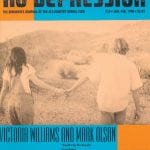Screen Door from Issue #13
“Mostly it’s the spaces between things where I feel comfortable. There are not usually crowded places.” With those words, Picking Up The Tempo: A Country Western Journal was launched more than two decades ago, its debut issue a mere eight pages of newsprint containing a single, solitary, wandering, rambling, epic adventure of an article centered loosely around Willie Nelson’s second annual Fourth of July picnic near College Station, Texas, in 1974.
A few weeks ago, a small box arrived in the mail containing a CD by Roxy Gordon, Smaller Circles, on an English label called Road Goes On Forever Records; a half-dozen or so ragged, yellowed, musty-smelling newspapers; and a brief note from Gordon: “Found No Depression yesterday in Brownwood, Texas, Hastings Records & Books store. Brought back twenty years ago when I was editing and publishing Picking Up The Tempo.”
In retrospect, it seems surprising I’d never heard of this publication previously, though my childhood years growing up in Northwest Austin in the 1970s were admittedly far removed from the “outlaw country” movement that adopted Armadillo World Headquarters as its ground zero, just a few miles south of our house. When you’re a kid, the distance between the suburbs and downtown can be like the distance between Houston and El Paso (both geographically and culturally).
It’s also a little difficult to tell, grazing through the pages of Picking Up The Tempo, exactly where the publication’s geographical center was (perhaps intentionally). Gordon’s home base at the time was in Albuquerque, New Mexico, but there’s also apparently a Colorado connection, and much of the action seems to center around Austin. Several of the ads are for long-gone Austin live-music venues such as the Alliance Wagon Yard, Castle Creek, the (old) Split Rail, and Soap Creek Saloon, announcing upcoming gigs by long-departed souls such as Kenneth Threadgill and John Vandiver, still-enduring veterans such as Alvin Crow and Johnny Bush, and mysteries such as Willis Alan Ramsey.
Ah, yes, Willis Alan Ramsey, the artist who makes Lucinda Williams look as prolific as Bob Dylan during his mid-’60s heyday. Ramsey’s self-titled debut of 1972 remains an absolute classic of country, folk, rock and everything in between — but the follow-up never came. I recall interviewing Ramsey in 1991, when he had resurfaced for a few live shows in Austin and there was talk of a new album finally coming out. It still hasn’t happened, and the pages of Picking Up The Tempo confirm just how long such speculation has been going on. An article by Mark Schiffler in the November 1975 edition notes that Ramsey “has been working on getting recording equipment together to cut his next album…He said he’s almost to the point of having the needed facilities and hopes to be spending more time in the studio and less time on the road by the turn of the year.” (Perhaps he meant the turn of the millennium…)
Indeed, reading through these back issues, what stands out are not so much the differences between the worlds of Picking Up The Tempo and No Depression, but the common bonds between the two eras. Gordon writes in the inaugural issue that Billy Joe Shaver was the star of Willie Nelson’s First Fourth of July Picnic and “was discovered to be the best songwriter in America,” largely on the strength of Waylon Jennings’ renditions of his songs. In 1996, No Depression co-editor Grant Alden traveled to Luckenbach, Texas, for Willie’s umpteenth annual picnic — and conducted a dual interview with Shaver and Jennings. Earlier this year, Alden reviewed the Justice Records reissue of Nelson’s classic Yesterday’s Wine album; the November 1975 issue of Picking Up The Tempo features an ad for that album (LP $2.99, tape $3.99). A June 1975 story profiles Jubal Clark, whose final disc, Gypsy Cowboy, arrived in my mailbox about the same time as Gordon’s package (Clark passed away earlier this year).
The author of the Jubal Clark piece was Joe Nick Patoski, who must have been fresh out of college back then; later he managed the True Believers for a while and wrote a book about Stevie Ray Vaughan (he’s currently an editor at Texas Monthly). Other interesting bylines that pop up in Picking Up The Tempo include longtime Nelson studio hand Joe Gracey, who submitted long interviews with Ernest Tubb and members of Bob Wills’ Texas Playboys; and notorious outlaw country songwriter David Allan Coe (whose catalog was tapped for a recent single by Will Oldham that’s reviewed elsewhere in this issue).
At the center of it all, however, was Gordon, whose CD reveals him to be more a poet than a musician, really, delivering spoken-word stories and recitations over music that ranges from rootsy to ethereal. Much of the subject matter deals with Native American themes (Gordon, who grew up in the tiny West-Central Texas town of Talpa, is of Choctaw descent). The semi-novelty number “Indians” is the hook on Smaller Circles, with a roll call of humorous declarations such as, “Fort Worth, Texas, is Indian, but Dallas, Texas, ain’t.” But the rest of the disc branches out in fascinatingly different directions, both musically and lyrically. And, surprise, there’s a name in the credits that once again unites the past with the present: Playing fiddle on two tracks is Max Johnston (see this issue’s article on Freakwater).
In the liner notes to Smaller Circles, Gordon writes: “My great uncle, Walter Bedell, played country dances, played pretty good guitar. I asked him one time what country music might be. Walter, long dead now, never did much but hunt, fish and play music. I have a collection of his songs. When I asked him that question, he looked at me as if I might not be bright. He said, ‘Why, it is music made in the country.'”
Sounds good enough to me.




